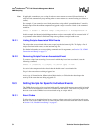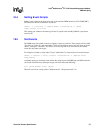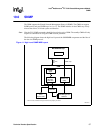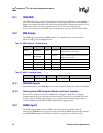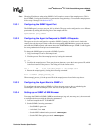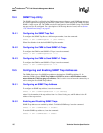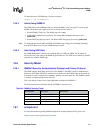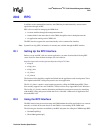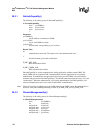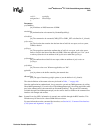
Intel
®
NetStructure
TM
ZT 7102 Chassis Management Module
SNMP
100 Technical Product Specification
19.4 SNMP Trap Utility
The SNMP trap utility is utilized by the CMM management software to send SNMP trap messages
to a remote application regarding any abnormal system events. When enabled, the CMM will issue
SNMP v1 traps on port 162. The CMM can also be configured to issue SNMP v3 traps. The SNMP
trap port can also be configured. For a description of all the traps that are issued, refer to Section
11.0, “Health Event Strings” on page 67.
19.4.1 Configuring the SNMP Trap Port
To configure the SNMP Trap Port to a different port number, issue the command:
cmmset -l cmm -d SNMPTrapPort -v [Port Number]
Where Port Number is the desired SNMP Trap Port number.
19.4.2 Configuring the CMM to Send SNMP v3 Traps
To configure the CMM to send SNMP v3 Traps, issue the command:
cmmset -l cmm -d SNMPTrapVersion -v v3
19.4.3 Configuring the CMM to Send SNMP v1 Traps
To configure the CMM to send SNMP v1 Traps, issue the command:
cmmset -l cmm -d SNMPTrapVersion -v v1
19.5 Configuring and Enabling SNMP Trap Addresses
The CMM allows up to five SNMP trap addresses destinations, SNMPTrapAddress1-5. In
redundant CMM systems, SNMP Trap Address 1 MUST be set to a valid IP address on the
network that the CMM can ping to at all times. This is used as a test of network connectivity as
well as being the first SNMP Trap Address.
19.5.1 Configuring an SNMP Trap Address
To configure an SNMP trap address, issue the command:
cmmset -l cmm -d SNMPTrapAddressN -v [IP address]
where N is the number of the trap address from 1 to 5 that is being set, and IP address is the IP
address of the trap receiver.
19.5.2 Enabling and Disabling SNMP Traps
SNMP Trap addresses are enabled by default. To disable SNMP traps, issue the command:
cmmset -l cmm -d SNMPenable -v disable
To enable SNMP trap addresses, issue the command:
cmmset -l cmm -d SNMPenable -v enable





